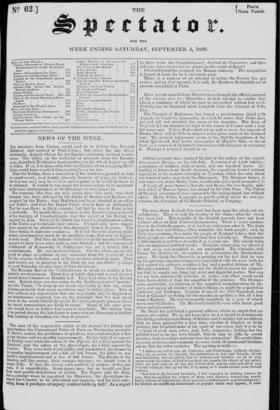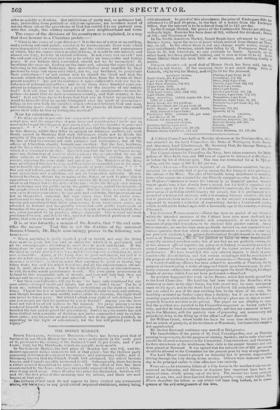The news from Ireland this week has been upon the
whole not un- satisfactory. There is only the tossing of the waters after the storm has been laid. The remarks of the English journals have not been without eflbct on their Irish contemporaries. There is more modera- tion in the Catholic papers, or at least an endeavour after it. The Irish papers do two bad things,—they stimulate the Irish people ; and, by their exaggerations, they make the people of England believe that the Irish people arc still more excited than they actually are. They create a little mischief, and then describe it as it great one. The recent trials give no important political results. Hodgens, whose case weauslverted to last week, was acquitted as we anticipated. The Catholics still blame Mr. Doherty for his conduct in prosecuting the Borrisokane cases. We think the Chronicle, in pointing out the fact that he was by his previous inquiries completely acquainted with the case both for and against the prisoner, supplies a key and a perfect defence of Mr. Doherty's conduct. There seems not the slightest reason for suspect- ing that he sought any thing but strict and impartial justice. Nor can we see how, consistently with law or justice, any other result could have been obtaii-wd than the acquittal of the prisoner. The Orange- men, meanwhile, are rejoicing at the acquittal, complimenting its ob- jects, and saying all manner of foOlish things, as might be expected in partisans and Irishmen. Captain Perse, of the 76th Regiment, was tried at Clonmel on Friday for the murder, in quelling a riot, of a boy named Slattery. He was honourably acquitted, by a jury of which seven were Catholics. Mr. Shcil conducted the case with much good sense and moderation. • Dr. Doyle has published a pastoral address, which we regret that we cannot give entire. We do not know how far it is lawful to denominate this distinguished person Bishop of Kildare and Loughlin; but no address that we have perused for a long time, whether of English or Irish prelates, has breathed more of the spirit of one whose duty it is to be " a lover of good men, sober, just, holy, temperate ; holding fast the faithful word as he 'has been taught, that he may be able, by sound doctrine, both to exhort and convince the gainsayers." We could dilate on every sentence, and comment on every.word, of sound and Christian adVice that the letter contains. The opening is noble :- " I address myself to you all, Catholics and Protestants, without distinc-
tion ; for, as lief:ire the Apostle, the distinction of Jew and Gentile, Greek and Barbarian, was merged in that of believer and brother ; so all of you, upon whom the name of God is invoked, are equally the object of my solici- tude; for each and • all of you has Christ died, and for each and all of you I would willingly Offer up my life, if by doing so I would ensure your eternal welfare.
" But first of all,;heloved brethren, I feel consoled in making known to you, that through4ut the extent of these vast dioceses, containing nearly half a million of infiabitants, there prevails a settled quiet—a profound peace ;
for though an occa*ional i ional disturbance or popular abuse may appear, it sub-
sides as quickly as it arises. But exhibitions of party zeal, or mutinous feel- ings, proceeding from political or religiods opinions, are nowhere heard of among those whom the providence of God has confided to my pastoral care, with this single, this solitary exception of your neighbourhood and town.
The cause of the divisions of his countrymen is explained, in a way that does honour to a Christian prelate :— " What is the cause of your divisions ? It is the use of a sign or an emblem, and a certain outward parade, employed to commemorate those wars which once depopulated our common country, and the existence and consequence of which, like the causes which produced them, it would he our interest, and almost our duty, to bury in eternal oblivion. Is not every war an evil? and the end and object of every just war is to obtain an honourable and lasting peace. If our fathers then contended, should not we be reconciled ? if, breathing the same air, feeding on the same soil, adoring the same God, and believing in the same Redeemer, they nevertheless were impelled by their passions to wage war upon each other, are we, my brethren, to perpetuate their misfortunes ? or not rather seek to stanch the blood and heal the wounds which they inflicted on, or caused to flow, from the bosom of their parent country ? Arc not six centuries a space sufficiently wide for the in- dulgence of national antipathies ; and do we think three hundred years em- ployed in religious strife too short a period for the exercise of our unholy zeal ? Is it not time for us, beloved brethren, to amalgamate—to mix to- gether—to know that we have a common country, and that country is Ire- land ? Is it not time for us to learn that God was its Christ reconciling the world to himself—that he openly triumphed over the spirit of dissension— killing in his Own body the enmities which subsisted between God and man, and bringing peace through the blood of his cross to all those who would prove their faith in him by loving one another."
Now for exhortation
Thf, tiiii2,..ypprik.; to ton—the lam c10011ntiVht Mini.does of reli4rion exhnct you, ale! •rfr,rs of your town a int uciichfinru•kno•l in cite you by
?cord and e.eample to relialoish yoar party frwl:, and tiro tinvether in peace and
concord. * * I need not tell you that the Bishops who preside in this diocese, whilst they differ in opinion on religious matters, arc both firmly agreed in thinking that such differences ought not to divide the subjects of the same state, and that Catholics and Protestants are bound by the law of God to exercise not only patience and forbearance, but all the offices of Christian charity towards one another. But the law, brethren, amt the King, who exem des it, sp,,aks to you on this subject with an authority which it is criminal to disobey. They tell watt that the law no longer recog- nizes any distinction of sects or classes ;Mimi.; the people—that we are all alike subjects of the King—paying, the same tribute, yielding, the same service, enjoying the same right; awl privileges. The Ministers of the King have proclaimed this law to you, awl they have commanded you in his name not to trouble the public peace by vain parade or party exhibition. a a But you will tell me, on the authority of one of the Judges of the land, that your processions and exhibitious are not in themselves unlawful. Do not, beloved brethren, distort the meaning of the Jude, or seek to place hint in opposition to those who represent and exercise the kingly power. Justice is blind to all thinT; hilt to the letter of the ; ilSt the King is ever waking and watching over the public safety, the public repose, and all the interests of the people whom God intrusts to his care. But the Judge has not deceived you—you &sad ve yourselves ; he has said, and said truly, that processions are not in themselves unlawful, but that when they tend to excite com- motion and to 'Heals the peace, then that they are unlawful. And if it be known and ascertained Idiot these processions, from whatsoever cause, are attended in Ireland and insyparahly connected with public excitement or breaches of the peace, then it is clear that, th meth in themselves lawful, they are, when resorted to in practice, always unlawful. This is what has been proclaimed to you, and it is to this, and not to a distorted position of some judge, that you are bound to atteud."
It is, or was formerly, a maxim of the Jesuits, that " the end sanc- tifies the means." That this is not the doctrine of the universal Roman Church, Dr. Doyle convincingly proves in the following sen- tences :—
" What anything is justly reputed g mil or lawful, not only the thing done must he g,md, but the enl or object for which it is performed, and all the circumstance; attending it, must also be good and lawful. If the thine time be had or Hula %end, the whole pcirforinani;:e is evil, erea thongli the oni,v1 rrhi4t 1r an l In, cirearn,i,ine.'.,, a tendinLr it, vast ever bid rbilw It 11(1'1 laterai, let Met it is bone tr. lit I :alert lel with Gel ut,iittilCr'.,, then. tits - formeirce so that in order that anything be good or lawful, the thing done, the end for which it is done, and all the circumstances attend- ing it, must also be good. For if the work itself, its end, or circumstances, be evil, then the whole performance is evil. Try your party processions in Ireland by this immutable tale of morals, and you will find that they are always and in every place evil and unlawful.
" But then you Catholics will say to me we have only combined for our own safety—to repel insult and injury, but not to inflict them' Far be it from me, beloved brethren, to impose restrictions on the right of self-de- fence. I know the law of nature has conceded this right to men and nations, and though human law may modify and regulate its exercise, the right itself can never be taken away. But whilst I admit your right of self-defence, how can you assure me that its exercise by you is lawful ? Among you the laws have not failed to :Jima redress to the injured. No judge among you has rendered himself liable to be reputed a partisan. Your magistrates have not bearded the law and despised the government. Justice in your courts has not been clothed with a mantle of derision, nor juries empanelled only to violate their oaths; you therefore are not compelled, nor in my opinion justified, in appealing to the right of self-defence, for the law will protect you from injury."



















 Previous page
Previous page